19种英语常用句型结构(精)
英语最常用的60个句型及例句
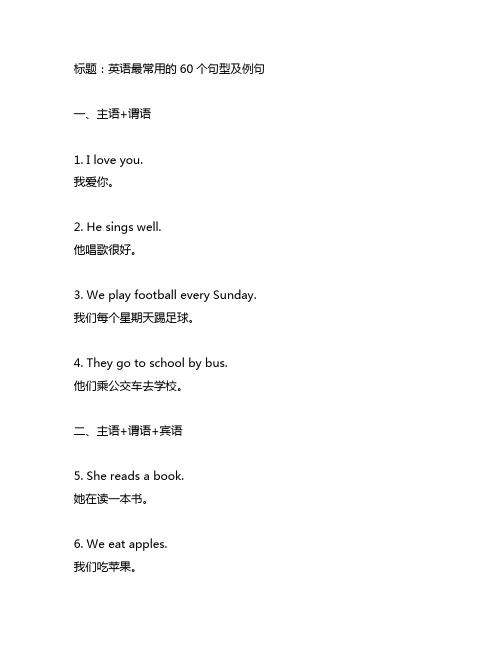
标题:英语最常用的60个句型及例句一、主语+谓语1. I love you.我爱你。
2. He sings well.他唱歌很好。
3. We play football every Sunday. 我们每个星期天踢足球。
4. They go to school by bus.他们乘公交车去学校。
二、主语+谓语+宾语5. She reads a book.她在读一本书。
6. We eat apples.我们吃苹果。
7. He speaks English.他讲英语。
8. They watch TV.他们看电视。
三、主语+谓语+宾语+宾语补足语9. She paints the wall red.她把墙刷成了红色。
10. We call him a hero.我们称他为英雄。
11. He considers the plan unfeasible. 他认为这个计划不可行。
12. They make their father proud.他们让父亲感到自豪。
四、主语+系动词+表语13. I am a teacher.我是一名老师。
14. She was happy.她很快乐。
15. He is my friend.他是我的朋友。
16. They are students.他们是学生。
五、主语+谓语+间宾+直宾17. She teaches us English. 她教我们英语。
18. He bought her a gift. 他给她买了一份礼物。
19. We tell him a story.我们给他讲故事。
20. They show us the way.他们给我们指路。
六、主语+谓语+宾补+宾语21. She made her sister cry.她让她妹妹哭了。
22. They found the problem solved. 他们发现问题已经解决了。
23. He heard the news spread.他听说了消息已经传开了。
英语所有句型结构
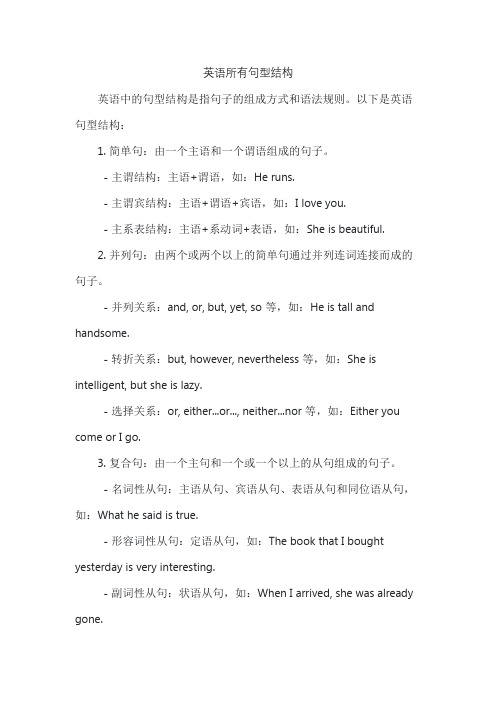
英语所有句型结构英语中的句型结构是指句子的组成方式和语法规则。
以下是英语句型结构:1. 简单句:由一个主语和一个谓语组成的句子。
- 主谓结构:主语+谓语,如:He runs.- 主谓宾结构:主语+谓语+宾语,如:I love you.- 主系表结构:主语+系动词+表语,如:She is beautiful.2. 并列句:由两个或两个以上的简单句通过并列连词连接而成的句子。
- 并列关系:and, or, but, yet, so 等,如:He is tall and handsome.- 转折关系:but, however, nevertheless 等,如:She is intelligent, but she is lazy.- 选择关系:or, either...or..., neither...nor 等,如:Either you come or I go.3. 复合句:由一个主句和一个或一个以上的从句组成的句子。
- 名词性从句:主语从句、宾语从句、表语从句和同位语从句,如:What he said is true.- 形容词性从句:定语从句,如:The book that I bought yesterday is very interesting.- 副词性从句:状语从句,如:When I arrived, she was already gone.4. 特殊句型:- 祈使句:表示命令、请求、建议或劝告等的句子,如:Open the door.- 感叹句:表示感叹语气的句子,如:How beautiful the flower is!- 倒装句:将谓语动词或表语提前的句子,如:Never have I seen such a beautiful place.- 强调句:通过强调词或句型来强调句子的某个部分,如:It is you who are wrong.。
英语基本句型结构

There are two bottles and an ashtray on the shelf .
There must be a pen in the box. There is going to be a meeting tonight. There has been a big tree on the top of the hill. There used to be a hospital there before the war.
基本句型 四
S +V +IO +O(主+谓+间宾+直宾)
此句型的句子有一个共同特点:谓语动词必须跟有两个宾语才能表达完整的意思。这两个宾语一个是动作的直接承受者(一般指物),另一个是动作的间接承受者(通常指人)。
eg: give sb. sth.→give sth. to sb.
make sb. sth.→make sth. for sb.
7. There was a lot of news about Zhang Ziyi on TV last night. There be 句式 8. She seems kind. 主 + 系 + 表 9. We found her in tears. 主 + 谓 + 宾 + 宾补 10. I assure you that this medicine will help you. 主 + 谓 + 间宾 + 直宾 11. He has refused to help them. 主 + 谓 + 宾
There be句式
主+谓+状
主+谓+宾
英语的基本句型结构

英语的基本句型结构
英语的基本句型结构通常包括主语、谓语和宾语。
下面是一些常见的基本句型结构:
1. 主 + 谓
例句:She sings.(她唱歌)
2. 主 + 谓 + 宾
例句:I love you.(我爱你)
3. 主 + 谓 + 宾 + 宾补
例句:He painted the wall red.(他把墙刷成了红色)
4. 主 + 谓 + 宾 + 宾语补足语
例句:They elected him president.(他们选举他为总统)
5. 主 + 谓 + 宾 + 宾语 + 宾语补足语
例句:She made her parents proud.(她让她的父母感到自豪)
6. 主 + 谓 + 间接宾 + 直接宾
例句:He gave me a book.(他给了我一本书)
7. 主 + 谓 + 宾 + 定语
例句:They have a big house.(他们有一所大房子)
8. 主 + 谓 + 定语 + 宾
例句:She is a doctor.(她是一名医生)
这些是基础的句型结构,英语中还有更多复杂的句型构造,但以上的结构是最基本也是最常见的。
高中英语句型结构大全
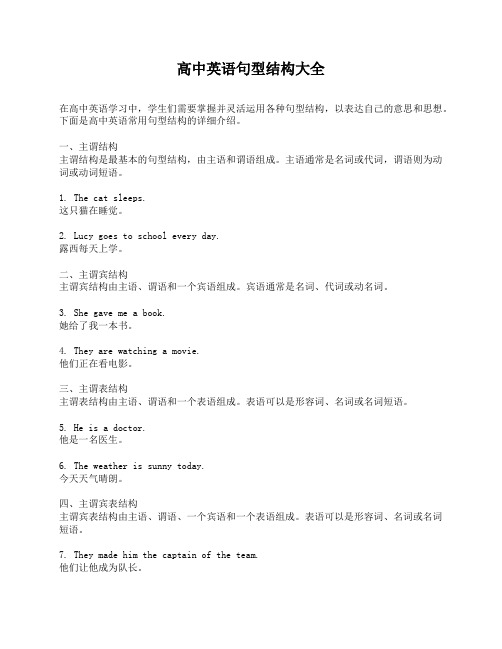
高中英语句型结构大全在高中英语学习中,学生们需要掌握并灵活运用各种句型结构,以表达自己的意思和思想。
下面是高中英语常用句型结构的详细介绍。
一、主谓结构主谓结构是最基本的句型结构,由主语和谓语组成。
主语通常是名词或代词,谓语则为动词或动词短语。
1. The cat sleeps.这只猫在睡觉。
2. Lucy goes to school every day.露西每天上学。
二、主谓宾结构主谓宾结构由主语、谓语和一个宾语组成。
宾语通常是名词、代词或动名词。
3. She gave me a book.她给了我一本书。
4. They are watching a movie.他们正在看电影。
三、主谓表结构主谓表结构由主语、谓语和一个表语组成。
表语可以是形容词、名词或名词短语。
5. He is a doctor.他是一名医生。
6. The weather is sunny today.今天天气晴朗。
四、主谓宾表结构主谓宾表结构由主语、谓语、一个宾语和一个表语组成。
表语可以是形容词、名词或名词短语。
7. They made him the captain of the team.他们让他成为队长。
8. We elected her president of the club.我们选她为俱乐部主席。
五、主谓双宾结构主谓双宾结构由主语、谓语和两个宾语组成。
其中一个宾语通常是人,另一个是物。
9. She bought me a gift.她给我买了一份礼物。
10. He taught his students English.他教他的学生英语。
六、There be结构There be结构用于描述某个地方存在或发生的事情。
它由there + be构成,be后面是主语。
11. There is a cat in the garden.花园里有一只猫。
12. There are two books on the table.桌子上有两本书。
84个英语基本句型

英语是一门广泛使用的语言,掌握基本句型可以帮助我们有效地表达自己的意思。
下面将介绍84个常用的英语基本句型,希望对大家学习英语有所帮助。
1. 主语 + 动词:I eat.2. 主语 + 动词 + 宾语:She reads books.3. 主语 + 不及物动词:They swim.4. 主语 + 系动词 + 表语:He is happy.5. 主语 + 动词 + 间接宾语 + 直接宾语:She gave me a gift.6. 主语 + 动词 + 宾语 + 宾语补足语:We consider him our friend.7. 主语 + 动词 + 间接宾语 + 直接宾语 + 宾语补足语:They made him their leader.8. 主语 + 动词 + 宾语 + 宾语补足语:He painted the wall red.9. 主语 + 动词 + 宾语 + 间接宾语:She told me a joke.10. 主语 + 不及物动词 + 表语:He became a doctor.11. 主语 + 不及物动词 + 宾语补足语:They elected him president.12. 主语 + 不及物动词 + 宾语 + 宾语补足语:She made him her assistant.13. 主语 + 系动词 + 宾语 + 宾语补足语:I find English interesting.14. 主语 + 系动词 + 表语 + 宾语:She called me a fool.15. 主语 + 系动词 + 宾语 + 宾语补足语:He made me his secretary.16. 主语 + 系动词 + 宾语 + 表语:They named the baby Adam.17. 主语 + 状语 + 动词:We ran quickly.18. 主语 + 状语 + 系动词 + 表语:He felt really tired.19. 主语 + 动词 + 状语:She sings beautifully.20. 主语 + 宾语 + 状语 + 动词:He won the game with great effort.21. 主语 + 宾语 + 状语 + 动词 + 宾语补足语:They elected her president with unanimous support.22. 主语 + 谓语 + 宾语 + 状语:We found the key under the bed.23. 主语 + 谓语 + 宾语 + 状语 + 宾语补足语:She named her daughter Lily out of love for flowers.24. 主语 + 谓语 + 不定式:They want to play.25. 主语 + 谓语 + 动词 + 不定式:He can swim.26. 主语 + 谓语 + 宾语 + 动词 + 不定式:She asked me to help.27. 主语 + 谓语 + 不定式 + 宾语补足语:We believe him to be honest.28. 主语 + 谓语 + 宾语 + 不定式 + 宾语补足语:He wants me to be his assistant.29. 主语 + 谓语 + 不定式 + 状语:You need to study hard.30. 主语 + 谓语 + 动名词:She enjoys swimming.31. 主语 + 谓语 + 宾语 + 动名词:They appreciate her singing.32. 主语 + 谓语 + 动名词 + 宾语补足语:I consider cooking an art.33. 主语 + 谓语 + 不定式 + 动名词:He started to learn painting.34. 主语 + 谓语 + 宾语 + 不定式 + 动名词:She saw him come in.35. 主语 + 谓语 + 宾语 + 不定式 + 状语:We made them stay longer.36. 主语 + 谓语 + 不定式 + 宾语补足语 + 动名词:He wants us to help him finish the project.37. 主语 + 谓语 + 不定式 + 宾语补足语 + 状语:I expect you to arrive on time.38. 主语 + 谓语 + 不定式 + 动名词 + 状语:They will try to solve the problem by working together.39. 主语 + 谓语 + 宾语 + 不定式 + 宾语补足语 + 状语:She persuaded him to stay after school for extra practice.40. 主语 + 谓语 + 分词:He looked tired.41. 主语 + 谓语 + 宾语 + 分词:They found the book interesting.42. 主语 + 谓语 + 分词 + 宾语补足语:We consider him qualified for the job.43. 主语 + 谓语 + 不定式 + 分词:She decided to leave quickly.44. 主语 + 谓语 + 宾语 + 不定式 + 分词:He heard her sing beautifully.45. 主语 + 谓语 + 分词 + 状语:They sat there, waiting for the bus.46. 主语 + 谓语 + 宾语 + 分词 + 状语:We saw her boarding the train.47. 主语 + 谓语 + 分词 + 宾语补足语 + 状语:He walked away, satisfied with his achievement.48. 主语 + 谓语 + 分词 + 不定式:She came running to me to ask a question.49. 主语 + 谓语 + 宾语 + 分词 + 不定式:They saw him standing alone in the rain.50. 主语 + 谓语 + 分词 + 宾语 + 不定式:We watched the movie, hoping to be entertained.51. 主语 + 谓语 + 不定式 + 分词 + 宾语补足语:He wants us to stay focused on our goals.52. 主语 + 谓语 + 不定式 + 分词 + 状语:She needs to finish her homework before going out.53. 主语 + 谓语 + 宾语 + 不定式 + 分词 + 状语:They made him work extra hours to meet the deadline.54. 主语 + 谓语 + 不定式 + 分词 + 宾语补足语:We believe you to have the ability to succeed.55. 主语 + 谓语 + 不定式 + 分词 + 宾语补足语 + 状语:He considered it a great honor to be chosen as the team captain.56. 主语 + 谓语 + 分词 + 状语 + 宾语:They finished the task, exhausted.57. 主语 + 谓语 + 宾语 + 分词 + 状语 + 宾语补足语:She found him standing there, helpless.58. 主语 + 谓语 + 分词 + 宾语 + 状语:He left the room, closing the door behind him.59. 主语 + 谓语 + 分词 + 宾语 + 宾语补足语:We saw her painting the wall red.60. 主语 + 谓语 + 宾语 + 分词 + 宾语补足语 + 状语:They heard him singing in the shower, beautifully.61. 主语 + 谓语 + 分词 + 不定式 + 状语:She stood there, not knowing what to say.62. 主语 + 谓语 + 宾语 + 分词 + 不定式 + 状语:He caught her reading his diary, secretly.63. 主语 + 谓语 + 分词 + 宾语 + 不定式 + 状语:They watched the kids playing happily in the park.64. 主语 + 谓语 + 不定式 + 分词 + 状语 + 宾语补足语:We want you to come prepared for the meeting.65. 主语 + 谓语 + 不定式 + 分词 + 宾语 + 状语:She asked me to stay quiet, not attracting attention.66. 主语 + 谓语 + 分词 + 状语 + 宾语 + 宾语补足语:They arrived at the party late, all dressed up.67. 主语 + 谓语 + 分词 + 宾语 + 状语 + 宾语补足语:I left the office, feeling satisfied with my performance.68. 主语 + 谓语 + 分词 + 宾语 + 宾语补足语 + 状语:He walked away, looking disappointed.69. 主语 + 谓语 + 不定式 + 宾语 + 分词:She wants us to keep the door closed, protecting the animals inside.70. 主语 + 谓语 + 不定式 + 状语 + 分词:They need to finish the project, no matter how hard it is.71. 主语 + 谓语 + 不定式 + 宾语 + 分词 + 状语:We would like you to come over for dinner, if you are available.72. 主语 + 谓语 + 不定式 + 分词 + 状语 + 宾语补足语:He decided to work harder, hoping to achieve better results.73. 主语 + 谓语 + 不定式 + 分词 + 宾语补足语 + 状语:She wanted him to leave, regardless of his apology.74. 主语 + 谓语 + 分词 + 宾语 + 不定式:They saw him running down the street to catch the bus.75. 主语 + 谓语 + 分词 + 不定式 + 宾语:He felt someone touch his shoulder, turning around to see who it was.76. 主语 + 谓语 + 分词 + 宾语 + 不定式 + 宾语补足语:She caught her sister eating her chocolate cake, scolding her for the theft.77. 主语 + 谓语 + 不定式 + 分词 + 宾语 + 状语:They asked me to speak louder, not being able to hear me clearly.78. 主语 + 谓语 + 不定式 + 分词 + 状语 + 宾语补足语:We advised him to approach the problem from a different angle, with the hope of finding a solution.79. 主语 + 谓语 + 不定式 + 宾语 + 分词 + 宾语补足语 + 状语:She reminded him to take his medicine, not forgetting his doctor's advice.80. 主语 + 谓语 + 不定式 + 分词 + 宾语 + 状语 + 宾语补足语:He urged them to apply for the position, fully aware of their qualifications. 81. 主语 + 谓语 + 分词 + 不定式 + 状语 + 宾语 + 宾语补足语:They watched the news report excitedly, hoping to see their favorite celebrity mentioned.82. 主语 + 谓语 + 分词 + 不定式 + 宾语 + 宾语补足语 + 状语:She left the room angrily, slamming the door shut.83. 主语 + 谓语 + 不定式 + 分词 + 状语 + 宾语 + 宾语补足语:We told him to study hard, not wasting his potential.84. 主语 + 谓语 + 不定式 + 分词 + 宾语 + 状语 + 宾语补足语:He encouraged her to believe in herself, never doubting her abilities.这些基本句型涵盖了常见的英语句子结构,掌握它们可以帮助你更好地表达自己的思想和意图。
常用英语短句句型结构
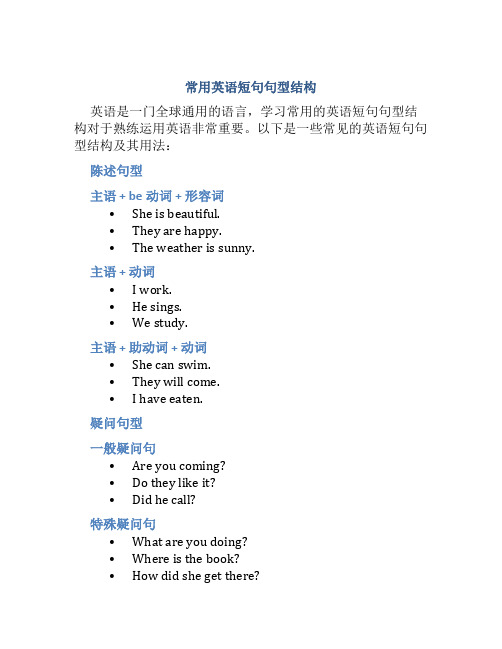
常用英语短句句型结构英语是一门全球通用的语言,学习常用的英语短句句型结构对于熟练运用英语非常重要。
以下是一些常见的英语短句句型结构及其用法:陈述句型主语 + be动词 + 形容词•She is beautiful.•They are happy.•The weather is sunny.主语 + 动词•I work.•He sings.•We study.主语 + 助动词 + 动词•She can swim.•They will come.•I have eaten.疑问句型一般疑问句•Are you coming?•Do they like it?•Did he call?特殊疑问句•What are you doing?•Where is the book?•How did she get there?祈使句型动词 + 宾语•Close the door.•Eat your dinner.•Be quiet.Let’s + 动词•Let’s go.•Let’s eat.•Let’s play.状态句型主语 + feel/look/sound + 形容词•She looks sad.•He sounds happy.•The music feels relaxing.主语 + seem/appear + to be•She seems to be tired.•They appear to be lost.•The situation seems to be changing.虚拟句型If + 主语 + 动词,主语 + 动词•If I were you, I would study harder.•If they had known, they would have come.•If she had time, she would help.以上是一些常见的英语短句句型结构,熟练掌握这些句型将有助于提高英语表达能力。
英语中常用的句型

英语中常用的62个句型句型1:There+be +主语+地点状语/ 时间状语There’s a boat in the river. 河里有条船。
句型2:What’s wrong with+sb. / sth. ?What’s wrong with your watch?你的手表有什么毛病?句型3:How do you like...?How do you like China?你觉得中国怎么样?句型4:What do you like about...?What do you like about China?你喜欢中国的什么?句型5:had better(not)+动词原形You’d better ask that policeman over there. 你最好去问问那边的那个警察。
句型6:How+adj. / adv. +主语+谓语!How cold it is today !今天多冷啊!What a/ an+adj. +n. +主语+谓语!What a fine picture it is!多美的一幅图画呀!句型7:Thank+sb. +for(doing)sth.Thank you for coming to see me. 感谢你来看我。
句型8:So+be/ 情态动词/ 助动词+主语He is a student. So am I. 他是一个学生,我也是。
句型9:... not ... until ...He didn’t have supper until his parents came back. 直到他的父母回来他才吃饭。
句型10:比较级+and+比较级The baby cried harder and harder. 那孩子哭得越来越厉害。
句型11:the +比较级,the +比较级The more one has,the more one wants. 越有越贪。
句型12:... as +adj./ adv.+as ...…not as(so) +adj. / adv. +as ...Do you think that art is as important as music?你认为艺术和音乐一样重要吗?Last Sunday the weather was not so wet as it is today. 上个星期天的天气不如今天的天气潮湿。
英语常用句型结构大全

英语常用句型结构大全英语常用句型结构有主谓结构、主系表结构、主谓宾结构、主谓双宾结构、主谓宾补结构等。
英语句子的基本成分有主语、谓语、宾语、表语、定语、状语、补语、同位语。
英语常用结构s十v主谓结构s十v十p主系表结构s十v十o主谓宾结构s十v十o1十o2主谓双宾结构s十v十o十c主谓宾补结构说明:s=主语;v=谓语;p=表语;o=宾语;o1=间接宾语;o2=直接宾语;英语五种基本句型句型1:主语+谓语。
即构成一个最简单的句子。
如:I dance.句型2:主语+谓语+宾语。
宾语,就是主语借助一个动作(谓语)作用的一个对象。
如:I hate him.句型3:主语+谓语+间接宾语+直接宾语。
如:I give him a book.句型4:主语+谓语+宾语+宾语补足语。
如:I want you to go with me.句型5:主语+系动词+表语。
如:It smells good.英语基本句式结构陈述句:是对事实、安排或观点进行“声明”或陈述。
陈述句可以是肯定句,也可以是否定句。
陈述句以句号结尾。
祈使句:是发出命令有时是要求的一种句式。
祈使句中一般没有主语,you是隐含的主语。
祈使句以句号或感叹号结尾。
疑问句:是提出问题的句式。
疑问句中,助动词位于主语前面,而主语后则跟着主动词,疑问句以问号结尾。
感叹句:通过感叹号!对一个陈述陈述句或祈使句中进行了强调。
简单句:简单句中没有连接词,如and、but、or等。
复合句:复合句由两个陈述构成,这两个陈述由连接词连在一起。
主从复合句:主从复合句中含有一个独立的从句,且至少有一个。
两个从句由一个从属连词连接起来。
感谢您的阅读,祝您生活愉快。
19 英语句子成分以及句子结构l练习

主动:主语+及物动词 + 宾语/双宾被动:主语(宾格--主格)+ be + done by sb英语句子成分一、主语(subject): 句子说明的人或事物。
The sun rises in the east.(名词)He likes dancing.(代词)Twenty years is a short time in history. (数词)Seeing is believing. (动名词)To see is to believe. (不定式)What he needs is a book. (主语从句)It is very clear that the elephant is round and tall like a tree. (It形式主语,主语从句是真正主语)二、谓语动词(predicate): 说明主语的动作、状态和特征。
We study English. (及物动词)The train left. (不及物动词)He is asleep. (系动词)I can speak two different languages.(情态动词+及物动词)They may be in the classroom. (情态动词+系动词)He didn’t go to Jane’s birthday party yesterday.(助动词+不及物动词)扩展:■动词的分类:根据其在句中的功能,动词可分为行为动词(及物动词vt、不及物动词vi)、系动词、助动词(和行为动词一起构成时态、语态的do, be, have, will等)和情态动词四类。
有些动词是兼类词。
如:We have lunch at 12.我们12点吃午饭。
(have是行为动词)We have been to New York.我们去过纽约。
(have是助动词)I am hungry.我饿了。
(am是系动词)She was beaten on the way home.她在回家的路上被人打了。
英语简单句型结构大全
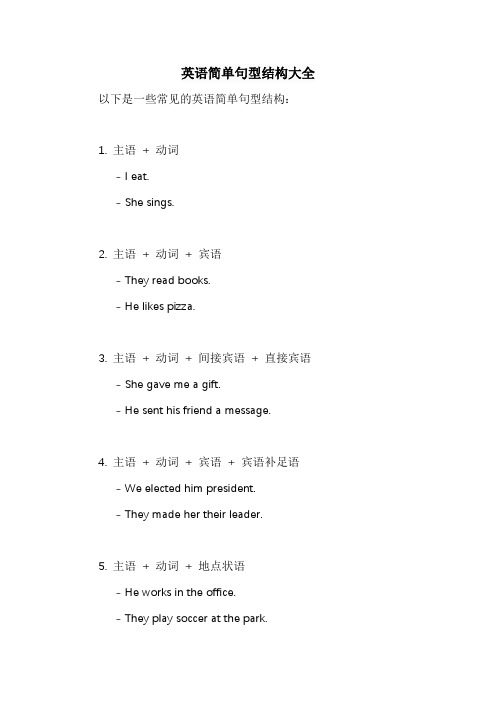
英语简单句型结构大全以下是一些常见的英语简单句型结构:1. 主语+ 动词- I eat.- She sings.2. 主语+ 动词+ 宾语- They read books.- He likes pizza.3. 主语+ 动词+ 间接宾语+ 直接宾语- She gave me a gift.- He sent his friend a message.4. 主语+ 动词+ 宾语+ 宾语补足语- We elected him president.- They made her their leader.5. 主语+ 动词+ 地点状语- He works in the office.- They play soccer at the park.6. 主语+ 动词+ 方式状语- She sings beautifully.- He runs fast.7. 主语+ 动词+ 时间状语- We go to school every day.- He visited his grandparents last week.8. 主语+ 动词+ 原因状语- They left because of the rain.- She cried out of happiness.9. 主语+ 动词+ 结果状语- He studied hard, so he passed the exam.- They worked together, thus they finished the project.10. 主语+ 动词+ 目的状语- He studies hard to get good grades.- We save money in order to buy a car.以上是一些常见的英语简单句型结构,希望对你有所帮助。
当然,英语句子的结构还有很多种,可以根据需要进行组合和变换,以表达更多的意思。
英语句子结构大全

英语句子结构大全英语句子结构大全导语:要掌握好英语,对句子结构的掌握是必须的。
以下是小编为大家整理的英语句子结构大全S+V是主谓S+V+DO 是主谓加双宾S+V+P是主谓宾S(主语)+V(谓语)+ I(间接宾语)+D(直接宾语)S(主语)+V(动词)+O (宾语)+Complement(补语)下面是讲解1.Subject (主语) + Verb (谓语)这种句型中的动词大多是不及物动词,这些动词常见的有:appear,apologize,arrive,come,die,disappear,exist,fall,happen,rise,等等.如:The students work very hard.学生们学习很努力.She apologized to me again.她再次向我道歉.The accident happened yesterday evening.事故是昨天晚上发生的.2.Subject (主语) + Link.V(系动词) + Predicate(表语)这种句型中的系动词一般可分为下列两类:(1)表示状态的连系动词.这些词有:be,look,seem,appear,smell,taste,sound,keep,remain,等等.如:Several players lay flat on the playground.几个队员平躺在操场上.We should remain modest and prudent any time.我们在任何时候都应该保持谦虚谨慎.This kind of food tastes terrible.这种食物吃起来很糟糕.The picture looks more beautiful at a certain distance.这幅画在一定的距离看更漂亮一些.(2)表示转变或结果的系动词.这些词有:become,get,grow,turn,go,come,prove,等等.如:Spring comes.It is getting warmer and warmer.春天到了,天气变得越来越暖和.Don't have the food.It has gone bad.不要吃那种食物,已经变质了.The facts prove true.事实证明是正确的.3.Subject(主语) + Verb (谓语) + Object (宾语)这种句型中的动词应为及物动词或者可以后接宾语的动词短语.同时,句子中有时含有与宾语有关的状语.作宾语的.成分常是:名词、代词、动词不定式、动名词或从句.如:You can put the books in your bag.你可以把书放在书包里.Farmers in our area grow lots of vegetables.我们这里的农民种很多种蔬菜.She lost the chance to make her appearance on the stage.她失去了在舞台上露面的机会.I prefer to make web pages.我更喜欢做网页.4.Subject(主语)+Verb(谓语)+ Indirect object(间接宾语)+Direct object (直接宾语)这种句型中作间接宾语的常常指“人”,直接宾语常常指“物”.如:Yesterday her father bought her a bicycle as a birthday present.昨天她父亲给她买了一辆自行车作为生日礼物.The old man is telling the children stories in the Long March.老人正在给孩子们讲长征中的故事.这种句型还可转换为其他两种句型:1)动词 + 宾语 + for sb.; 2)动词 + 宾语+to sb..如:Please show me your picture.-Please show your picture to me.请把你的画给我看一下.I'll offer you a good chance as long as you don?t lose heart.—I'll offer a good chance for you as long as you don't lose heart.只要你不失去信心,我会给你提供机会的.5.Subject(主语)+Verb (动词)+Object (宾语)+Complement(补语)这种句型中的宾语+ 补语可统称为“复合宾语”.担任补语的常常是名词、形容词、副词、介词短语、分词、动词不定式等.如:Keep the children quiet,please.请让孩子们安静下来.He painted the wall white.他把墙漆成白色.We found him an honest person.我们发现他是一个诚实的人.His mother told him not to play on the street.他母亲告诉他不要在街上玩.注意:动词have,make,let,see,hear,notice,feel,observe,watch 等后面所接的动词不定式作宾补时,不带to.如:The boss made him do the work all day.老板让他整天做那项工作.。
英文句型结构大全

英文句型结构大全
以下是英文中的一些常见句型结构:
1. 主语 + 谓语(不及物动词):例如:The sun rises in the east.
2. 主语 + 谓语(及物动词)+ 宾语:例如:I love English.
3. 主语 + 系动词 + 表语:例如:He is a student.
4. 主语 + 谓语(及物动词)+ 双宾语:例如:She gave me a book.
5. 主语 + 谓语(及物动词)+ 宾语 + 补足语:例如:We elected him monitor.
6. 主语 + 谓语(不定式或动名词)作主语:例如:Reading books is one of my hobbies.
7. 主语 + 谓语(从句):例如:I believe that she will succeed.
8. 祈使句:例如:Open the door, please.
9. 疑问句:例如:Is this your book?
10. 并列句:由并列连词(如and、or、but等)连接的两个或多个简单句。
例如:I like English and she likes math.
以上是英语中的基本句型结构,了解这些结构可以帮助
你更好地理解英语句子和表达自己的思想。
英语句式结构大全

英语句式结构大全是一个非常广泛的主题,涵盖了各种不同类型的句子和句式。
以下是一些常见的英语句式结构:
主语+ 谓语(S + V)
这种句式结构是最基本的,其中主语是句子中的主体,谓语是对主语进行描述或动作。
例如:
I am a student.
主语+ 谓语+ 宾语(S + V + O)
这种句式结构中,谓语后面跟着宾语,宾语是动作的承受者。
例如:
She reads books.
主语+ 谓语+ 间接宾语+ 直接宾语(S + V + IO + DO)
这种句式结构中,谓语后面有两个宾语,一个是间接宾语,一个是直接宾语。
间接宾语通常是接受者以外的受益者,而直接宾语是动作的直接对象。
例如:
He gave me a book.
主语+ 谓语+ 宾语+ 宾补(S + V + O + C)
这种句式结构中,谓语后面跟着宾语和宾补,宾补是对宾语的进一步描述或补充。
例如:
They elected him president.
主语+ 系动词+ 表语(S + V + P)
这种句式结构中,系动词连接主语和表语,表语是对主语的描述或状态。
例如:
She is a doctor.
以上只是英语句式结构的一部分,实际上英语的句式结构非常丰富和复杂,包括更多的复合句、从句、被动句等等。
要全面掌握英语的句式结构,需要多阅读、多写作、多练习。
英语常见句型结构
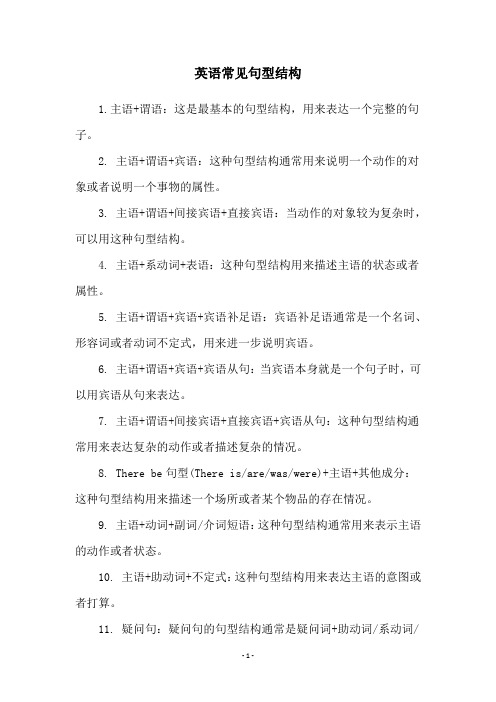
英语常见句型结构
1.主语+谓语:这是最基本的句型结构,用来表达一个完整的句子。
2. 主语+谓语+宾语:这种句型结构通常用来说明一个动作的对象或者说明一个事物的属性。
3. 主语+谓语+间接宾语+直接宾语:当动作的对象较为复杂时,可以用这种句型结构。
4. 主语+系动词+表语:这种句型结构用来描述主语的状态或者属性。
5. 主语+谓语+宾语+宾语补足语:宾语补足语通常是一个名词、形容词或者动词不定式,用来进一步说明宾语。
6. 主语+谓语+宾语+宾语从句:当宾语本身就是一个句子时,可以用宾语从句来表达。
7. 主语+谓语+间接宾语+直接宾语+宾语从句:这种句型结构通常用来表达复杂的动作或者描述复杂的情况。
8. There be句型(There is/are/was/were)+主语+其他成分:这种句型结构用来描述一个场所或者某个物品的存在情况。
9. 主语+动词+副词/介词短语:这种句型结构通常用来表示主语的动作或者状态。
10. 主语+助动词+不定式:这种句型结构用来表达主语的意图或者打算。
11. 疑问句:疑问句的句型结构通常是疑问词+助动词/系动词/
谓语动词+主语+其他成分。
12. 祈使句:祈使句的句型结构通常是动词+其他成分,用来表达请求、命令或者建议等。
英语口语常用句式
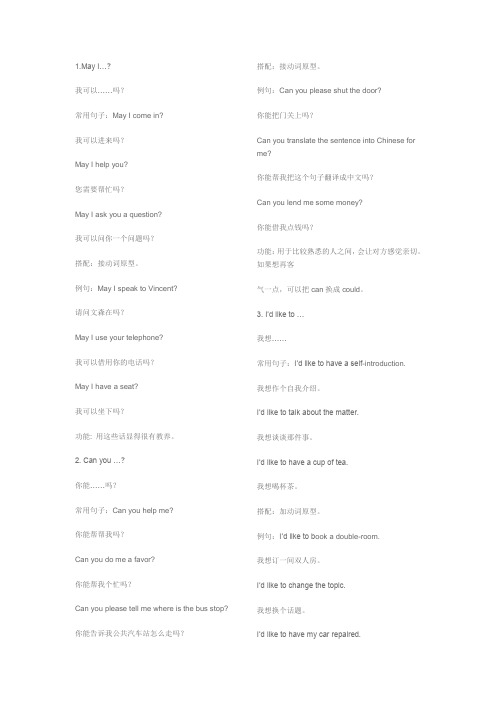
1.May I…?我可以……吗?常用句子:May I come in?我可以进来吗?May I help you?您需要帮忙吗?May I ask you a question?我可以问你一个问题吗?搭配:接动词原型。
例句:May I speak to Vincent?请问文森在吗?May I use your telephone?我可以借用你的电话吗?May I have a seat?我可以坐下吗?功能: 用这些话显得很有教养。
2. Can you …?你能……吗?常用句子:Can you help me?你能帮帮我吗?Can you do me a favor?你能帮我个忙吗?Can you please tell me where is the bus stop? 你能告诉我公共汽车站怎么走吗?搭配:接动词原型。
例句:Can you please shut the door?你能把门关上吗?Can you translate the sentence into Chinese for me?你能帮我把这个句子翻译成中文吗?Can you lend me some money?你能借我点钱吗?功能:用于比较熟悉的人之间,会让对方感觉亲切。
如果想再客气一点,可以把can换成could。
3. I’d like to …我想……常用句子:I’d like to have a self-introduction.我想作个自我介绍。
I’d like to talk about the matter.我想谈谈那件事。
I’d like to have a cup of tea.我想喝杯茶。
搭配:加动词原型。
例句:I’d like to b ook a double-room.我想订一间双人房。
I’d like to change the topic.我想换个话题。
I’d like to have my car repaired.-我想请人帮我把汽车修好。
英语常用的句型结构有哪些

英语常用的句型结构有哪些
英语是一个重要的学科,也是在社会上交流的必要语言,那幺下面小编
为大家集锦一些英语常用的句型及结构。
【一】英语常用的句型结构句型1:subject(主语)+verb(谓语)
这种句型中的动词大多是不及物动词,所谓不及物动词,就是这种动词后
不可以直接接宾语。
常见的动词如:
work,sing,swim,fish,jump,arrive,come,die,disappear,cry,happen等。
句型2:subject(主语)+link.v(系动词)+predicate(表语)
这种句型主要用来表示主语的特点、身份等。
其系动词一般可分为下列两类:
(1)表示状态。
这样的词有:be,look,seem,smell,taste,sound,keep等。
(2)表示变化。
这类系动词有:become,turn,get,grow,go等。
句型3:subject(主语)+verb(谓语)+object(宾语)
这种句型中的动词一般为及物动词,所谓及物动词,就是这种动词后可以直接接宾语,其宾语通常由名词、代词、动词不定式、动名词或从句等来充当。
注意:英语中的许多动词既是及物动词,又是不及物动词。
句型4:subject(主语)+verb(谓语)+indirectobject(间接宾语)+directobject(直
接宾语)
这种句型中,直接宾语为主要宾语,表示动作是对谁做的或为谁做的,在
句中不可或缺,常常由表示“物”的名词来充当;间接宾语也被称之为第二宾语,。
19种英语常用句型结构(精)
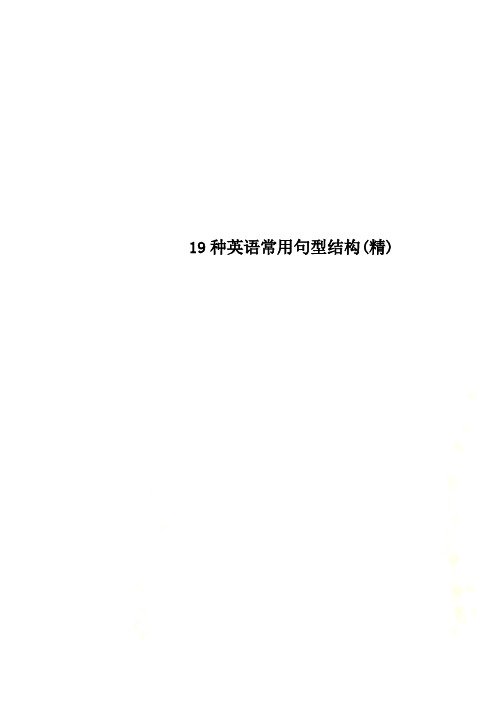
19种英语常用句型结构(精)19种英语常用句型结构[精]初学英语的人常常感到在掌握一些英语单词和基本语法后,在英语说和写方面还是很难表达自己,其中一个原因是没有掌握一些英语句型,只有掌握了一些句型才能比较正确、完整地表达自己。
下面是一些常用的句型及其例句。
1.否定句型2.判断句型3.祝愿祈使句式4.感叹句型5.疑问句型6.数词句型7.关联指代句型8.比较句型9.比喻类句型10.条件假设句11.时间句型12.地点句型13.原因句型14.目的句型15.结果句型16.程度句型17.让步句型18.转折句型19.省略句1. 否定句型1) 一般否定句I don't know this. No news is good news.There is no person /not a person/not any person in the house.2)特指否定He went to his office, not to see him.I am sorry for not coming on time.I don't think/believe/suppose/feel/imagine you are right.3)部分否定I don't know all of them.I can't see everybody/everything.All the answers are not right.(并非所有答案都对。
)All is not gold that glitters. (闪光的不一定都是金子。
)Both of them are not right.(并非两人都对。
)4)全体否定None of my friends smoke.I can see nothing/nobody.Nothing can be so simple as this.Neither of them is right.5) 延续否定You didn't see him, neither/nor did I.You don't know, I don't know either.He doesn't know English, let alone/to say nothing of/not to speak of French.6) 半否定句We seldom/hardly/scarcely/barely hear such fine singing.I know little English.I saw few people.7) 双重否定You can't make something out of nothing.What's done cannot be undone.There is no sweet without sweat.No gain without pains.I can't help /keep/ laughing whenever I hear it. No man is so old but (that) he can learn.8)排除否定Everyone is ready except you.He did nothing but play.But for your help, I couldn't do it.9)加强否定I won't do it at all.I can't see it any more.He is no longer a boy.2. 判断句型1) 一般判断句It is important for us to learn English.It is kind of you to help me.Sincere means honest.The boy is called/named Tom.We regarded/considered it as an honor.2)强调判断It is English that we should learn.It is he who helped me a lot.3)弱式判断Your sentence doesn't sound/look/appear/feel right. You look/seem as if/as thought you had been there before.Maybe/Perhaps/ she is ill.He is probably ill.He is likely ill.It is possible that he is late4) 正反判断That sounds all right, but in fact it is not.5) 互斥判断He or you are wrong.Either he is right or I am.6) 注释判断He is a walking dictionary, that is (to say), he can remember many English words.7) 比较判断It is more a picture than a poem.Incomplete knowledge of style is worse than useless.3. 祝愿祈使句式1) 一般句式Study hard and keep fit.Be brave! Don't be shy!Get out of here.2)强语式Do tell me.Never tell a lie.3) 委婉祈使句Please tell me the true.Would/Will/Won't do me a favor?Would/Do you mind my smoking?What/How/ about going there on foot?4)建议祈使句Let us go. Let us know the time.Don't let the fire out.Let's not waste the time.You'd better start early.Shall we listen to some music?Why don't you get something to drink?I suggest we (should) take the train.Suppose/supposing you pick me up at about six?5)祝愿句Success to you!Wish you a good journey.Here's to your success!May you have a happy marriage.Allow me to propose a toast to our friendship! 4. 感叹句型How well he speaks!How kind she is!What nice weather it is!What a beautiful day!Here he comes!Such is life!Wonderful!Help! (救命啊!)5. 疑问句型1) 一般疑问句Is he a doctor?Do you the way to the station?2)反意疑问句He is a teacher, isn't he?It is quite cheap, don't you think?3) 特殊疑问句What is the distance / width/ size / population / temperature / fare?Who is he?What is he?(他是干什么工作的?)What is he like?How/Where is he?How do you like him?What do you think of him?What ever do you mean by saying this?4)选择疑问句Is he a doctor or a nurse?Do you love it or not?5)间接疑问句Do you know how old he is?Tell me if (whether) you like it.What do you think/say/suppose I should do?6.数词句型1) 表数目It is exactly ten o'clock.It is five miles away from here.He is more than/over/ at least not less than 20. He is under/at most/no more than 20.2)表年月日He was born on April 22, 1994/in 1994/on the morning of October 1.3)表年龄He is 20 years old. = He is 20 years of age.He is at the age of 10.4)表倍数It is four times that of last years.This is four times as big (again) as that one. This is four times bigger than that one.The income is double what it was.The output of coal was 200% greater than in 1998.5)表计量It is 10 meters long/wide/high.It costs me 100 yuan. / It is worth 100 yuan.I spent 10 hours to finish it.It took me 10 days to finish it.7. 关联指代句型1)两项关联I have two books, one is Chinese; the other English.I have five books, one is Chinese; the others English. To say is one thing, but/and/ to do is another.One the one hand, I am your teacher, and on the other hand, I am also you friend.Some like to play football, others are fond of basketball.2)先后顺序First/firstly, I wish good health, second/secondly success in your study, third/thirdly good luck in everything.First stop, then look, finally cross.At first/in the beginning/ he word hard.Later/Afterwards he is not so diligent.3)修饰限制This is the same book as I lost yesterday. (不是同一本书,但书名、内容等相同)This is the same book that I lost yesterday.(同一本书)Don't trust such a man as over praiseyou.He/One/Those/They who should come failed to appear.A man/A person/The one/Anyone/People who saw her liked her very much.The day/time/moment will come when China is strongest in the world.4) 两项连接He can speak not only English but also French.The book is both interesting and instructive.It is neither cold nor hot.Please either come in or go out.The old worker has experience and knowledge as well.5)加和关系Besides literature, we have grammar and writing. Apart from oxygen, there are some other gases in the air.In addition to 'if', there are many other conjunctions that can introduce conditional clauses.I must go now, incidentally, if you want that book. You seem to like tea, so do I.8. 比较句型1)等比句He is as tall as I.He is the same height as I.She is no less diligent than he.The lab is no better than a cottage.2) 差比句I speak English worse than he does. / He is not so/as tall as I am.Our knowledge is much inferior to their.3) 极比句He is the tallest of all in the class.None/No one/ is so blind as those that won't see. Nothing is so easy as this.4)比例句The more a man knows, the more he feels his ignorance.5) 择比句He is taller than any other boy in the class.It is better late than never.They would die than live as slaves.He prefers doing to talking.He prefers to do rather than to talk.He prefers mathematics to English.I'd rather stay here.6)对比句You think me idle, but on the contrary, I am busy. They are working hard while you are wasting your time.9.比喻类句型We must work like him.He behaves as his father does.He speaks English as if/ as though he was a foreigner.10.条件假设句1) 一般事实If we succeed, what will the people say?Suppose it rains, what shall we do?Persevere and you'll succeed.2)虚拟条件句If I were you, I would go.If you had seen it, you would have been moved.3)反条件句Unless you try, you'll never succeed.Don't move, or/else/otherwise I'll shot.4)唯一条件句If only I have another chance, I shall do better.Only in this way can we learn English well.So/As long as we don't lose heart, we'll succeed.5)推论条件句Since that is so, there is no more to say.Now that you are grown up, you must stop this behavior.11. 时间句型1)一般时When I see him, I'll tell him.2) 同一时间You'll grow wiser as you grow older.Work while you work, play while you play.He worked, at the same/in the meantime he listened to the music.3)限制时Every/each time when I went to his house, he was out.By the time that we got there, he was out.4)交替时Sometimes he sings, sometimes he dances.At one time the baby cries, at another it talks.5)先时I stopped him before he began to talk with me.6)后时I'll tell you after I finish it.7)紧接时As soon as I see him, I'll tell him.Once you begin, you must continue.The (very) moment/instant (that) I saw him, I recognized him.On hearing the news, she bust into tears. Hardly had I seen the light, when I heard a loud thundering.8)延续时I haven't seen him since I came here.A friend is never known till/until a man has need.12. 地点句型1) 一般地点Where have you been?Where there is a will, there is a way.2)方位Guangdong lies in the south of China.Japan is / lies to the east of China.The house faces (to) the south.He is sitting at the front of the classroomHe is standing in front of/before me.He is sitting at the back of/behind me.He is sitting in the back of/at the rear of the classroom.He is sitting next to/besides me.He is sitting close to/near me.At the top of/On top of the shelf, there are some books.He is sitting on the left/right.The mountain you see to the right is the Red Mountain.13.原因句型He didn't go to school because he was ill.Since we are all here, let's begin our meeting.It might rain yesterday, for the ground was wet. Now (that) we have finished the work, we can gohome.I am glad to meet you. / I am sorry that I hear that. Thank you for your help.That is why he failed to come.He didn't come because of/on account of the weather.He went out of curiosity. / I succeeded thanks to his help.This failure is due to the fact they lack experience. Owing to our joint efforts, the task was fulfilled. What are you learning English for?For what reason did you choose this?What's the point of asking his to do that?How come you never told me about it?What with the wind and what with the rain, our walk was spoiled.14.目的句型He stopped aside so that she could go in.He sits in the front in order that he can see words clearly.He gets up early so as to/in order to have time to do exercises.He repeated it for fear that there should be any mistake.15. 结果句型It was very cold, so that the river froze.They cost a lot of money, so we use them carefully. They cost a lot of money; therefore, we use them carefully.He is such a good man that every one likes him.He ran so fast that no one could catch him.He hurried to the house only to find that it was empty.I was caught in the rain. As a result, I had a bad cold.16. 程度句型How often do you write to your parents?How long do you stay at home?It is so beautiful that we all love it.It is too big for you.He is too excited to speak.He is not old enough to know this.The letter must be sent as soon as possible.You must work as hard as you can.As far as I know, he can speak only English.17. 让步句型Though/Although he is rich, (yet/still) he doesn't show off.Young as he is, he knows a lot of things.Even if/though he succeeded, he was not proud. No matter what you say, I'll still try to do it.Keep calm, whatever happens.In spite of this, we must go ahead with our plans. Regardless of all the difficulties, we'll fight it out to the end.18. 转折句型I searched everywhere but could not find him. You may go, only return quickly.He is seriously ill; still there is hope of his recovery. It looked like rain; however, it was clear in the afternoon.He is still young, yet he is high up in the position. He didn't tell me the truth, I know it, though.19. 省略句型I think/say/suppose/expect/believe/hope so.Why not come earlier next time。
英语句子结构分解
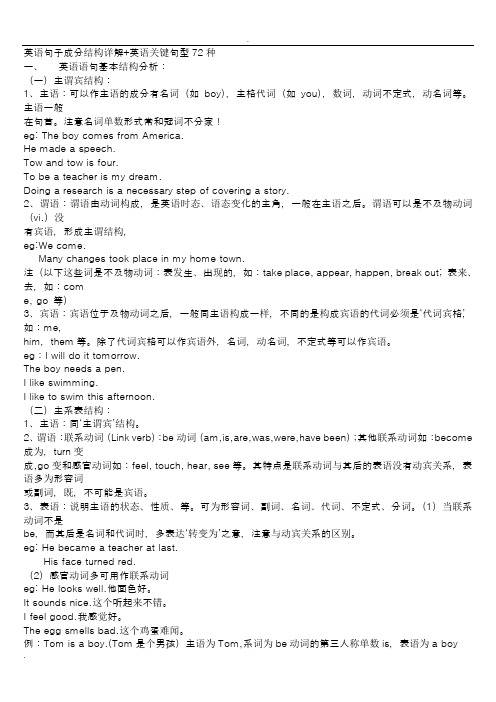
英语句子成分结构详解+英语关键句型72种一、英语语句基本结构分析:(一)主谓宾结构:1、主语:可以作主语的成分有名词(如boy),主格代词(如you),数词,动词不定式,动名词等。
主语一般在句首。
注意名词单数形式常和冠词不分家!eg: The boy comes from America.He made a speech.Tow and tow is four.To be a teacher is my dream.Doing a research is a necessary step of covering a story.2、谓语:谓语由动词构成,是英语时态、语态变化的主角,一般在主语之后。
谓语可以是不及物动词(vi.)没有宾语,形成主谓结构,eg:We come.Many changes took place in my home town.注(以下这些词是不及物动词:表发生、出现的,如:take place, appear, happen, break out; 表来、去,如:come, go 等)3、宾语:宾语位于及物动词之后,一般同主语构成一样,不同的是构成宾语的代词必须是‘代词宾格’,如:me,him,them等。
除了代词宾格可以作宾语外,名词,动名词,不定式等可以作宾语。
eg:I will do it tomorrow.The boy needs a pen.I like swimming.I like to swim this afternoon.(二)主系表结构:1、主语:同‘主谓宾’结构。
2、谓语:联系动词(Link verb):be动词(am,is,are,was,were,have been);其他联系动词如:become 成为,turn变成,go变和感官动词如:feel, touch, hear, see等。
其特点是联系动词与其后的表语没有动宾关系,表语多为形容词或副词,既,不可能是宾语。
英语常用句型结构大全
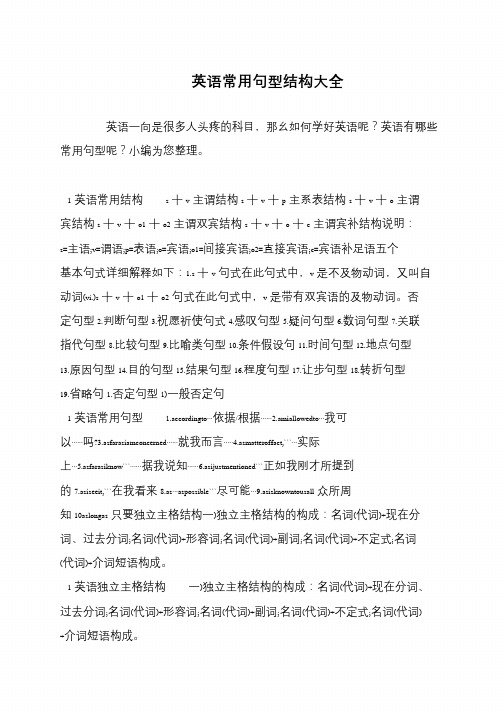
英语常用句型结构大全英语一向是很多人头疼的科目,那幺如何学好英语呢?英语有哪些常用句型呢?小编为您整理。
1英语常用结构s十v主谓结构s十v十p主系表结构s十v十o主谓宾结构s十v十o1十o2主谓双宾结构s十v十o十c主谓宾补结构说明:s=主语;v=谓语;p=表语;o=宾语;o1=间接宾语;o2=直接宾语;c=宾语补足语五个基本句式详细解释如下:1.s十v句式在此句式中,v是不及物动词,又叫自动词(vi.)s十v十o1十o2句式在此句式中,v是带有双宾语的及物动词。
否定句型2.判断句型3.祝愿祈使句式4.感叹句型5.疑问句型6.数词句型7.关联指代句型8.比较句型9.比喻类句型10.条件假设句11.时间句型12.地点句型13.原因句型14.目的句型15.结果句型16.程度句型17.让步句型18.转折句型19.省略句1.否定句型1)一般否定句1英语常用句型 1.accordingto···依据/根据······2.amiallowedto···我可以······吗?3.asfarasiamconcerned······就我而言·····4.asmatteroffact,```···实际上···5.asfarasiknow```······据我说知······6.asijustmentioned```正如我刚才所提到的7.asiseeit,```在我看来8.as···aspossible```尽可能···9.asisknowntousall众所周知10aslongas只要独立主格结构一)独立主格结构的构成:名词(代词)+现在分词、过去分词;名词(代词)+形容词;名词(代词)+副词;名词(代词)+不定式;名词(代词)+介词短语构成。
- 1、下载文档前请自行甄别文档内容的完整性,平台不提供额外的编辑、内容补充、找答案等附加服务。
- 2、"仅部分预览"的文档,不可在线预览部分如存在完整性等问题,可反馈申请退款(可完整预览的文档不适用该条件!)。
- 3、如文档侵犯您的权益,请联系客服反馈,我们会尽快为您处理(人工客服工作时间:9:00-18:30)。
19种英语常用句型结构 [精]初学英语的人常常感到在掌握一些英语单词和基本语法后,在英语说和写方面还是很难表达自己,其中一个原因是没有掌握一些英语句型,只有掌握了一些句型才能比较正确、完整地表达自己。
下面是一些常用的句型及其例句。
1.否定句型2.判断句型3.祝愿祈使句式4.感叹句型5.疑问句型6.数词句型7.关联指代句型8.比较句型9.比喻类句型10.条件假设句11.时间句型12.地点句型13.原因句型14.目的句型15.结果句型16.程度句型17.让步句型18.转折句型19.省略句1. 否定句型1) 一般否定句I don't know this. No news is good news.There is no person /not a person/not any person in the house.2)特指否定He went to his office, not to see him.I am sorry for not coming on time.I don't think/believe/suppose/feel/imagine you are right.3)部分否定I don't know all of them.I can't see everybody/everything.All the answers are not right.(并非所有答案都对。
)All is not gold that glitters. (闪光的不一定都是金子。
)Both of them are not right.(并非两人都对。
)4)全体否定None of my friends smoke.I can see nothing/nobody.Nothing can be so simple as this.Neither of them is right.5) 延续否定You didn't see him, neither/nor did I.You don't know, I don't know either.He doesn't know English, let alone/to say nothing of/not to speak of French.6) 半否定句We seldom/hardly/scarcely/barely hear such fine singing.I know little English.I saw few people.7) 双重否定You can't make something out of nothing.What's done cannot be undone.There is no sweet without sweat.No gain without pains.I can't help /keep/ laughing whenever I hear it. No man is so old but (that) he can learn.8)排除否定Everyone is ready except you.He did nothing but play.But for your help, I couldn't do it.9)加强否定I won't do it at all.I can't see it any more.He is no longer a boy.2. 判断句型1) 一般判断句It is important for us to learn English.It is kind of you to help me.Sincere means honest.The boy is called/named Tom.We regarded/considered it as an honor.2)强调判断It is English that we should learn.It is he who helped me a lot.3)弱式判断Your sentence doesn't sound/look/appear/feel right. You look/seem as if/as thought you had been there before.Maybe/Perhaps/ she is ill.He is probably ill.He is likely ill.It is possible that he is late4) 正反判断That sounds all right, but in fact it is not.5) 互斥判断He or you are wrong.Either he is right or I am.6) 注释判断He is a walking dictionary, that is (to say), he can remember many English words.7) 比较判断It is more a picture than a poem.Incomplete knowledge of style is worse than useless.3. 祝愿祈使句式1) 一般句式Study hard and keep fit.Be brave! Don't be shy!Get out of here.2)强语式Do tell me.Never tell a lie.3) 委婉祈使句Please tell me the true.Would/Will/Won't do me a favor?Would/Do you mind my smoking?What/How/ about going there on foot?4)建议祈使句Let us go. Let us know the time.Don't let the fire out.Let's not waste the time.You'd better start early.Shall we listen to some music?Why don't you get something to drink?I suggest we (should) take the train.Suppose/supposing you pick me up at about six?5)祝愿句Success to you!Wish you a good journey.Here's to your success!May you have a happy marriage.Allow me to propose a toast to our friendship!4. 感叹句型How well he speaks!How kind she is!What nice weather it is!What a beautiful day!Here he comes!Such is life!Wonderful!Help! (救命啊!)5. 疑问句型1) 一般疑问句Is he a doctor?Do you the way to the station?2)反意疑问句He is a teacher, isn't he?It is quite cheap, don't you think?3) 特殊疑问句What is the distance / width/ size / population / temperature / fare?Who is he?What is he?(他是干什么工作的?)What is he like?How/Where is he?How do you like him?What do you think of him?What ever do you mean by saying this?4)选择疑问句Is he a doctor or a nurse?Do you love it or not?5)间接疑问句Do you know how old he is?Tell me if (whether) you like it.What do you think/say/suppose I should do?6.数词句型1) 表数目It is exactly ten o'clock.It is five miles away from here.He is more than/over/ at least not less than 20.He is under/at most/no more than 20.2)表年月日He was born on April 22, 1994/in 1994/on the morning of October 1.3)表年龄He is 20 years old. = He is 20 years of age.He is at the age of 10.4)表倍数It is four times that of last years.This is four times as big (again) as that one.This is four times bigger than that one.The income is double what it was.The output of coal was 200% greater than in 1998.5)表计量It is 10 meters long/wide/high.It costs me 100 yuan. / It is worth 100 yuan.I spent 10 hours to finish it.It took me 10 days to finish it.7. 关联指代句型1)两项关联I have two books, one is Chinese; the other English.I have five books, one is Chinese; the others English.To say is one thing, but/and/ to do is another.One the one hand, I am your teacher, and on the other hand, I am also you friend.Some like to play football, others are fond of basketball.2)先后顺序First/firstly, I wish good health, second/secondly success in your study, third/thirdly good luck in everything.First stop, then look, finally cross.At first/in the beginning/ he word hard.Later/Afterwards he is not so diligent.3)修饰限制This is the same book as I lost yesterday. (不是同一本书,但书名、内容等相同)This is the same book that I lost yesterday.(同一本书)Don't trust such a man as over praiseyou.He/One/Those/They who should come failed to appear.A man/A person/The one/Anyone/People who saw herliked her very much.The day/time/moment will come when China is strongest in the world.4) 两项连接He can speak not only English but also French.The book is both interesting and instructive.It is neither cold nor hot.Please either come in or go out.The old worker has experience and knowledge as well.5)加和关系Besides literature, we have grammar and writing. Apart from oxygen, there are some other gases in the air.In addition to 'if', there are many other conjunctions that can introduce conditional clauses.I must go now, incidentally, if you want that book. You seem to like tea, so do I.8. 比较句型1)等比句He is as tall as I.He is the same height as I.She is no less diligent than he.The lab is no better than a cottage.2) 差比句I speak English worse than he does. / He is not so/as tall as I am.Our knowledge is much inferior to their.3) 极比句He is the tallest of all in the class.None/No one/ is so blind as those that won't see. Nothing is so easy as this.4)比例句The more a man knows, the more he feels his ignorance.5) 择比句He is taller than any other boy in the class.It is better late than never.They would die than live as slaves.He prefers doing to talking.He prefers to do rather than to talk.He prefers mathematics to English.I'd rather stay here.6)对比句You think me idle, but on the contrary, I am busy. They are working hard while you are wasting your time.9.比喻类句型We must work like him.He behaves as his father does.He speaks English as if/ as though he was a foreigner.10.条件假设句1) 一般事实If we succeed, what will the people say?Suppose it rains, what shall we do?Persevere and you'll succeed.2)虚拟条件句If I were you, I would go.If you had seen it, you would have been moved. 3)反条件句Unless you try, you'll never succeed.Don't move, or/else/otherwise I'll shot.4)唯一条件句If only I have another chance, I shall do better. Only in this way can we learn English well.So/As long as we don't lose heart, we'll succeed.5)推论条件句Since that is so, there is no more to say.Now that you are grown up, you must stop this behavior.11. 时间句型1)一般时When I see him, I'll tell him.2) 同一时间You'll grow wiser as you grow older.Work while you work, play while you play.He worked, at the same/in the meantime he listened to the music.3)限制时Every/each time when I went to his house, he was out. By the time that we got there, he was out.4)交替时Sometimes he sings, sometimes he dances.At one time the baby cries, at another it talks.5)先时I stopped him before he began to talk with me.6)后时I'll tell you after I finish it.7)紧接时As soon as I see him, I'll tell him.Once you begin, you must continue.The (very) moment/instant (that) I saw him, I recognized him.On hearing the news, she bust into tears.Hardly had I seen the light, when I heard a loud thundering.8)延续时I haven't seen him since I came here.A friend is never known till/until a man has need.12. 地点句型1) 一般地点Where have you been?Where there is a will, there is a way.2)方位Guangdong lies in the south of China.Japan is / lies to the east of China.The house faces (to) the south.He is sitting at the front of the classroomHe is standing in front of/before me.He is sitting at the back of/behind me.He is sitting in the back of/at the rear of the classroom.He is sitting next to/besides me.He is sitting close to/near me.At the top of/On top of the shelf, there are some books.He is sitting on the left/right.The mountain you see to the right is the Red Mountain.13.原因句型He didn't go to school because he was ill.Since we are all here, let's begin our meeting.It might rain yesterday, for the ground was wet.Now (that) we have finished the work, we can go home.I am glad to meet you. / I am sorry that I hear that. Thank you for your help.That is why he failed to come.He didn't come because of/on account of the weather. He went out of curiosity. / I succeeded thanks to his help.This failure is due to the fact they lack experience. Owing to our joint efforts, the task was fulfilled. What are you learning English for?For what reason did you choose this?What's the point of asking his to do that?How come you never told me about it?What with the wind and what with the rain, our walk was spoiled.14.目的句型He stopped aside so that she could go in.He sits in the front in order that he can see words clearly.He gets up early so as to/in order to have time to do exercises.He repeated it for fear that there should be any mistake.15. 结果句型It was very cold, so that the river froze.They cost a lot of money, so we use them carefully. They cost a lot of money; therefore, we use them carefully.He is such a good man that every one likes him.He ran so fast that no one could catch him.He hurried to the house only to find that it was empty.I was caught in the rain. As a result, I had a bad cold.16. 程度句型How often do you write to your parents?How long do you stay at home?It is so beautiful that we all love it.It is too big for you.He is too excited to speak.He is not old enough to know this.The letter must be sent as soon as possible.You must work as hard as you can.As far as I know, he can speak only English.17. 让步句型Though/Although he is rich, (yet/still) he doesn't show off.Young as he is, he knows a lot of things.Even if/though he succeeded, he was not proud.No matter what you say, I'll still try to do it. Keep calm, whatever happens.In spite of this, we must go ahead with our plans. Regardless of all the difficulties, we'll fight it out to the end.18. 转折句型I searched everywhere but could not find him.You may go, only return quickly.He is seriously ill; still there is hope of his recovery.It looked like rain; however, it was clear in the afternoon.He is still young, yet he is high up in the position. He didn't tell me the truth, I know it, though.19. 省略句型I think/say/suppose/expect/believe/hope so. Why not come earlier next time给大家推荐一个英语微信群Empty Your Cup英语微信群是目前学习英语最有效的方法,群里都是说英语,没有半个中文,而且规则非常严格,是一个超级不错的英语学习环境,群里有好多英语超好的超牛逼的人,还有鬼佬和外国美眉。
